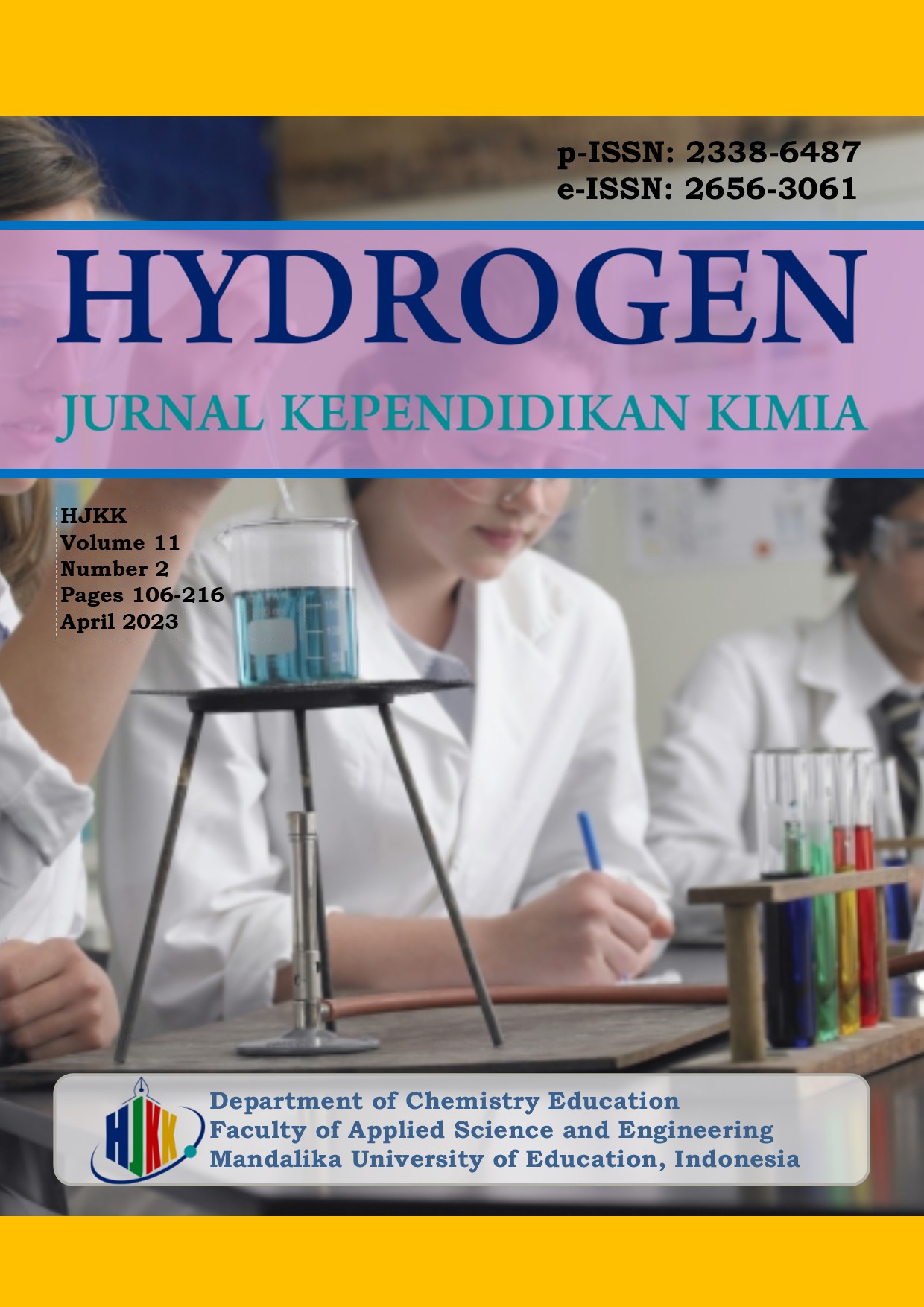Analyzing Misconceptions of Acid-Base Topic among Chemistry Education Students in Online Learning Settings: A Case Study
DOI:
https://doi.org/10.33394/hjkk.v11i2.7147Keywords:
misconceptions, online learning, acid-base materialAbstract
References
Djangi M, J., Sugiarti & Ramdani. (2021). Kesulitan Belajar Peserta Didik Kelas XI MIPA 3 SMAN 3 Maros pada Materi Larutan Penyangga. Prosiding Seminar Nasional 2021. ISBN: 978-623-387-014-6.
Elvia, R., Rohiat, S., & Ginting, S. M. (2020). Identifikasi Miskonsepsi Mahasiswa Pada Pembelajaran Daring Matematika Kimia Melalui Tes Diagnostik Three Tier Multiple Choice. Hydrogen: Jurnal Kependidikan Kimia, 9(2), 84-96.
Elvinawati, E., Rohiat, S., & Solikhin, F. (2022). Identifikasi Miskonsepsi Mahasiswa dalam Mata Kuliah Kimia Sekolah II pada Materi Asam Basa. ALOTROP, 6(1), 10-14.
Firman & Sari, R.R. (2020). Pembelajaran Online di Tengah Pandemi Covid-19. Indonesian Journal of Educational Science (IJES), 2(2), 81-89.
Hijriyati, N., Muharini, R., Ulfah, M., Erlina., & Lestari, I. (2022). Hubungan Kebiasaan Belajar dengan Hasil Belajar Siswa Mata Pelajaran Kimia pada Masa Pandemi Covid-19. Hydrogen: Jurnal Kependidikan Kimia, 10(2):146-161.
Izza, R. I., Nurhamidah, N., & Elvinawati, E. (2021). Analisis Miskonsepsi Siswa Menggunakan Tes Diagnostik Esai Berbantuan Cri (Certainty of Response Index) Pada Pokok Bahasan Asam Basa. ALOTROP, 5(1), 55-63.
Lathifa, U., Ibnu, S., & Budiasih, E. (2015). Identifikasi kesalahan konsep larutan asam-basa dengan menggunakan teknik certainty of response index (CRI) termodifikasi.
Nurhamidah., Amida, N & Elvia, R. (2022). Model Pembelajaran Discovery Berbasis Blended Learning untuk Meningkatkan Aktivitas dan Hasil Belajar Kimia Mahasiswa. Hydrogen: Jurnal Kependidikan Kimia, 10(1):1-9.
Khery Yusran & Raodyatun. (2015). Respon dan Aktivitas Siswa dan Guru pada Penerapan Perangkat Pembelajaran Asam Basa dengan Pendekatan Somatis Auditori Visual Intelektual (SAVI). Hydrogen: Jurnal Kependidikan Kimia, 2(1):161165.
Raudha, I, I., Nurhamidahm., & Elvinawati .(2021). Analisis Miskonsepsi Siswa Menggunakan Tes Diagnostik Esai Berbantuan CRI (Certainty Of Response Index) Pada Pokok Bahasan Asam Basa. Jurnal Pendidikan dan Ilmu Kimia, 5(1): 55 – 63.
Putri, R. S., Wigati, I., & Laksono, P. J. (2022, August). Faktor-Faktor yang Mempengaruhi Miskonsepsi Siswa pada Materi Asam dan Basa. In Prosiding Seminar Nasional Pendidikan Kimia (Vol. 1, No. 1, pp. 280-286).
Sariati, N. K., Suardana, I. N., & Wiratini, N. M. (2020). Analisis kesulitan belajar kimia siswa kelas XI pada materi larutan penyangga. Jurnal Imiah Pendidikan dan Pembelajaran, 4(1), 86-97.
Suparno, P. (2013). Miskonsepsi & Perubahan Konsep Pendidikan Fisika. Jakarta: Grasindo.
Suyono., Delhita, A. (2012). Penggunaan Think-Aloud Protocols untuk Mengatasi Miskonsepsi Sisiwa Pada Materi Pokok Stoikiometri Di SMA Khadijah Surabaya. Prosiding Seminar Nasional Kimia Unesa 2012– ISBN 978-979-028-550-7
Tayubi, Y. R. (2005). Identifikasi Miskonsepsi Pada Konsep-Konsep Fisika Menggunakan Certainty of Response Index (CRI). UPI.
Downloads
Published
How to Cite
Issue
Section
Citation Check
License
License and Publishing Agreement
In submitting the manuscript to the journal, the authors certify that:
- They are authorized by their co-authors to enter into these arrangements.
- The work described has not been formally published before, except in the form of an abstract or as part of a published lecture, review, thesis, or overlay journal.
- That it is not under consideration for publication elsewhere,
- That its publication has been approved by all the author(s) and by the responsible authorities – tacitly or explicitly – of the institutes where the work has been carried out.
- They secure the right to reproduce any material that has already been published or copyrighted elsewhere.
- They agree to the following license and publishing agreement.
Copyright
Authors who publish with Hydrogen: Jurnal Kependidikan Kimia agree to the following terms:
- Authors retain copyright and grant the journal right of first publication with the work simultaneously licensed under a Creative Commons Attribution License (CC BY-SA 4.0) that allows others to share the work with an acknowledgment of the work's authorship and initial publication in this journal.Â
- Authors are able to enter into separate, additional contractual arrangements for the non-exclusive distribution of the journal's published version of the work (e.g., post it to an institutional repository or publish it in a book), with an acknowledgment of its initial publication in this journal.
- Authors are permitted and encouraged to post their work online (e.g., in institutional repositories or on their website) prior to and during the submission process, as it can lead to productive exchanges, as well as earlier and greater citation of published work.
Licensing for Data Publication
Hydrogen: Jurnal Kependidikan Kimia uses a variety of waivers and licenses, that are specifically designed for and appropriate for the treatment of data: Open Data Commons Attribution License, http://www.opendatacommons.org/licenses/by/1.0/ (default) Other data publishing licenses may be allowed as exceptions (subject to approval by the editor on a case-by-case basis) and should be justified with a written statement from the author, which will be published with the article.







